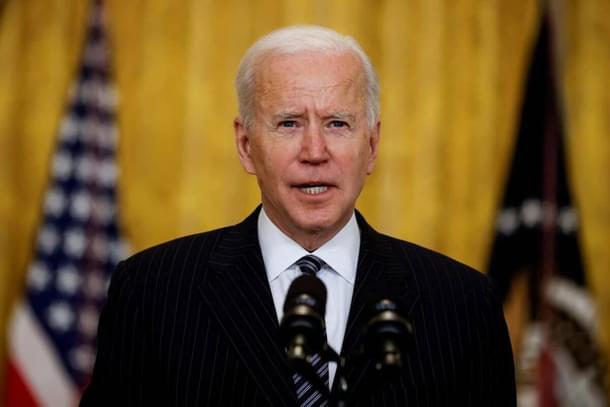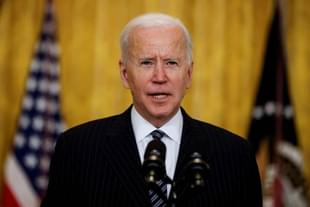World
Joe Biden's Single Term — America's Strangest Presidency?
Venu Gopal Narayanan
Jul 23, 2024, 10:55 AM | Updated Dec 27, 2024, 02:45 PM IST
Save & read from anywhere!
Bookmark stories for easy access on any device or the Swarajya app.


American President Joe Biden’s decision to pull out of his re-election campaign on 21 July had a ring of inevitability to it, since it had been clear for some years now that age had caught up with him.
Biden’s choice — if it was indeed his — marks the beginning of the end of what has probably been the strangest presidential term America has ever endured.
At one level, it is an excellent decision, not least because it spares him, and the public, repeated embarrassments.
For nearly two years now, it was clear that Biden was no longer fit to hold the most important post in the world.
His repeated mumbles, fumbles and stumbles, initially a source of great mirth, unfortunately descended into a miasma of political indecision and policy myopia with global consequences.
It might not have mattered if Biden was the head of a nondescript nation, but as the ‘leader of the free world’ (a phrase pregnant with American exceptionalism), and as a self-appointed keeper of both world peace and morality, his numerous decisions had such a resounding impact across the globe, that they will reverberate for long after he is relegated to the footnotes of history.
Strangely though, Biden began his term in the opposite direction, on a strong note. His very first executive order, on the day of his inauguration in January 2021, was the cancellation of the Keystone XL crude oil pipeline between Canada and America.
It was a major victory for environmentalists, even as it put the axe to oilmen’s plans of exploiting more light, tight oil sands in Alberta, Canada, and the Williston sedimentary basin straddling Montana and North Dakota in America. But it was still a decisive policy move.
Next, he authorised a high-level meeting with China in Anchorage, Alaska. Although the meeting was made memorable for the degree of acrimony exhibited by both sides in public, it allowed the Americans to put forth a powerful foreign policy position rich with determination and intent.
Secretary of State Anthony Blinken stated that America’s “relationship with China will be competitive where it should be, collaborative where it can be, and adversarial where it must be”. This was bolder and more aggressive than his predecessor Donald Trump.
Two months later, in May 2021, Biden amazed the world by lifting sanctions on a major underwater gas pipeline project called Nord Stream 2, which ran through the Baltic Sea from Russia to Germany. Moscow and Berlin broke into wild cheers, since this project had been stalled by American pressure for ages.
While many felt that Biden had made an imprudent move by removing the heaviest geopolitical leverage America could wield over Russia, Swarajya said that this was a smart move because, now, crude oil prices would rise, and that would help Biden rev his economy by increasing domestic oil and gas output from tight sands. And, lo and behold, oil prices started to rise that month, precisely as predicted.
But then, with the summer, everything started to come apart for Biden. First was the utterly chaotic, unplanned, and politically dangerous manner in which he expedited a withdrawal of American troops from Afghanistan. By this act, Biden handed the country back to the Taliban on a golden platter, along with sizeable inventories of expensive military equipment.
He also undid two decades of democracy-building, and the numerous valiant sacrifices made by Americans there to that end. Worse, he abruptly created a power vacuum at the regional level, which Russa, China, or Pakistan could step into, and added heavily to India’s already-long list of strategic issues.
Second, was his bold gamble in late 2021, to make America a major exporter of oil and gas (incidentally, a plan initiated by his predecessor, Trump, which was hit by the Covid-19 pandemic). By it, Biden sought to gain control of energy prices, and reduce the painful inflation which had afflicted his country.
Once again, Swarajya rightly predicted that while this ambitious plan was technically feasible, its chances of success were low for a number of reasons. After all, did one really expect a president who killed the Keystone XL pipeline to maintain discipline of policy in a sustained manner, and mollify those constituents who had cheered his first decision? It was a contradiction that couldn’t work, and eventually didn’t.
The greatest irony about the failure of Biden’s big energy gamble, is that it failed even after the West’s breach with Russia offered America the opportunity of the century, to become Europe’s principal energy provider. The cheers were swiftly turning to jeers.
But the crowning glory of Biden’s biggest blunders has to be the manner in which he got the West to toe the line, first instigating Russia into invading Ukraine in February 2022, and then, inviting economic and fiscal mayhem upon Europe, by instituting a truly senseless set on sanctions on Russia.
Even as energy shortages began in Europe, even as inflation there soared, and even as America failed to supply the replacement volumes for banned Russian oil and gas, the sanctions regime died in stillbirth courtesy China and India, who both escaped the inflation epidemic, by purchasing unprecedented volumes of oil from Russia at stiffly discounted prices.
The net result was staggering. Dissonance between Europe and America, unheard of and unthinkable, hitherto, grew like mushrooms in the dark to start affecting politics in Europe.
In election after election, including the recent snap legislative one in France, political parties who opposed this clueless, adversarial path adopted against Russia did extremely well.
At the global level, the impact of this rupture with Russia was even more profound, and so intense that its fuller effects have yet to be felt. Simply put, forcing Russia’s hand knells the beginning of the end of the Bretton Woods regime — a system devised by the Western victors of the Second World War in 1945, which effectively isolated the Soviet Union and Mao’s China, at a time when most of Africa and Asia was still colonised.
It has fuelled multipolarity, and lowered America’s standing in the world. It will take a great deal of political effort for the next incumbent to recover such losses, and restore the country to what it was, or what it ought to be, if he or she ever can.
This is the ‘legacy’ Biden leaves behind as he dodders into the sunset, the strangest president America has ever had.
Venu Gopal Narayanan is an independent upstream petroleum consultant who focuses on energy, geopolitics, current affairs and electoral arithmetic. He tweets at @ideorogue.





